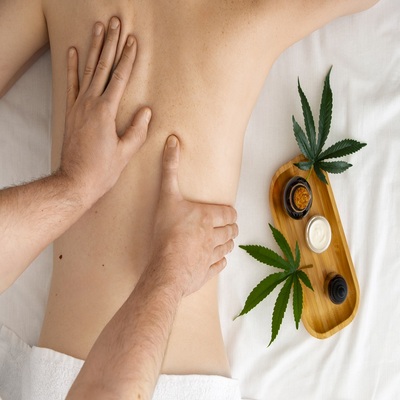Why is the Choice of Oil Paramount in Ayurvedic Massage Therapy
-
Posted by W1 Massage Co.2U Filed in Other #Deep Tissue Massage Service in London #ayurvedic massage london #Swedish Massage Service in London 324 views
Have you ever wondered why some massage therapies use generic lotions, whilst others meticulously select specific, often warm, oils? If you're considering an Ayurvedic massage in London, you'll quickly discover that the choice of oil is far from arbitrary – it's a cornerstone of the therapy itself, transforming a simple massage into a deeply personalised and medicinal treatment. "Why is the oil so important?" you might ask. And "How does my Ayurvedic massage London therapist know which one to choose?" The answer lies deep within the ancient wisdom of Ayurveda, where the skin is seen not just as a protective barrier, but as a vital organ for absorption and healing. Understanding this fundamental principle is key to unlocking the true benefits of Ayurvedic massage therapy.
1. Ayurvedic Massage: A Holistic Science of Balance
Ayurveda, originating in India over 5,000 years ago, is a holistic healing system that views health as a delicate balance of mind, body, and spirit.
Central to this philosophy are the three Doshas – Vata (air and ether), Pitta (fire and water), and Kapha (earth and water) – unique mind-body constitutions that govern all physiological and psychological processes.
When our Doshas are out of balance due to diet, lifestyle, stress, or environment, we experience dis-ease. Ayurvedic massage therapy aims to restore this equilibrium, and the chosen oil acts as a powerful therapeutic agent in this balancing act. It's more than just a lubricant; it's medicine for your skin.
2. More Than Just Lubrication: The Therapeutic Power of Ayurvedic Oils
Unlike conventional massage oils, Ayurvedic oils undergo detailed preparation using traditional methods and techniques. This process involves infusing base oils (like sesame, coconut, or sunflower) with specific herbs, spices, and even minerals over extended periods.
This process, known as taila paka, extracts the powerful therapeutic properties of the botanicals, creating highly concentrated, healing concoctions.
- Transdermal Absorption:
Ayurveda believes that the skin, being the largest organ, serves as a powerful pathway for directly absorbing herbal effects into the deeper tissues, muscles, and bloodstream.
- Dosha-Specific Properties:
Each oil inherently retains qualities that either balance or aggravate certain Doshas. For instance, sesame oil is warming and grounding, ideal for Vata. Coconut oil is cooling and soothing, perfect for Pitta.
This is why, when you seek an Ayurvedic massage, a skilled practitioner will take the time to evaluate your unique constitution.
3. The Dosha-Specific Choice: Your Personalised Prescription
The truly unique aspect of this massage therapy lies in its personalized approach, guided by your dominant Dosha and any current imbalances (Vikriti). Here's how Ayurvedic oils are chosen:
- For Vata Imbalance:
Vata is characterised by coldness, dryness, lightness, and movement (stress, joint pain, dry skin). Ayurvedic oils for Vata are therefore warming, grounding, and nourishing.
- Common Oils:
Warm Sesame oil is paramount, often infused with herbs like Ashwagandha (for strength) or Bala (for rejuvenation).
- Benefits:
Helps to relax the nervous system, lubricate joints, reduce anxiety, and combat dryness.
- For Pitta Imbalance:
Pitta is characterised by heat, sharpness, intensity, and oiliness (inflammation, skin rashes, irritability, heartburn). Ayurvedic oils for Pitta are cooling, calming, and soothing.
- Common oils include coconut oil, Sunflower oil, or Ghee, often infused with cooling herbs such as Brahmi (for the mind) or Shatavari (for soothing).
- Benefits:
Reduces inflammation, soothes irritated skin, calms anger, and cools the body.
- For Kapha Imbalance:
Kapha is characterised by coldness, heaviness, sluggishness, and stagnation (congestion, lethargy, water retention). Ayurvedic oils for Kapha are typically warming, stimulating, and lighter.
- Common Oils:
Lighter Sesame oil or Mustard oil, often infused with stimulating herbs like Ginger, Calamus, or Eucalyptus.
- Benefits:
Promotes circulation, reduces congestion, invigorates the mind, and helps with detoxification.
When you book an Ayurvedic massage, your practitioner's initial consultation will be crucial in determining which oil blend is best suited for your specific needs.
4. Beyond Physical: The Energetic and Sensory Impact
The importance of the oil extends beyond its physical absorption. The warmth of the Abhyanga oil, its distinctive aroma, and the ritual of its application all contribute greatly to the therapeutic experience.
- Sensory Connection:
The scent of herbal oils in Ayurvedic massage can have a profound impact on the nervous system.Therefore, promoting ease or invigoration through the principles of aromatherapy.
- Energetic Flow:
Warm oil helps to open the body's channels (srotas). Thus, it facilitates the smooth flow of Prana (life force energy) and aids in the release of toxins.
- Mind-Body Connection:
The nourishing, constant contact of the oil during the massage helps to ground the mind, calm emotions, and create a deep sense of peace.
5. What to Expect from Your Ayurvedic Massage London Practitioner
A reputed Ayurvedic massage therapist will:
- Conduct a thorough initial consultation to determine your Dosha constitution and current imbalances.
- Carefully select and warm the appropriate Ayurvedic oil for your specific needs.
- Educate you on the benefits of the chosen oil and its relevance to your well-being.
- Offer guidance on post-massage care, which often includes allowing the oil to absorb for a few minutes.
Final Thoughts
The selection of oil in Ayurvedic massage therapy is far from a trivial decision; it is a fundamental element that transforms a beneficial massage into a personalised, therapeutic, and profoundly healing experience. If you are seeking to balance your Doshas, nourish your body, and calm your mind, ensure your next Ayurvedic massage in London focuses on the right oil for you. Choose W1 Massage Co.2U to experience healing and relaxation with this unqiue massage.





